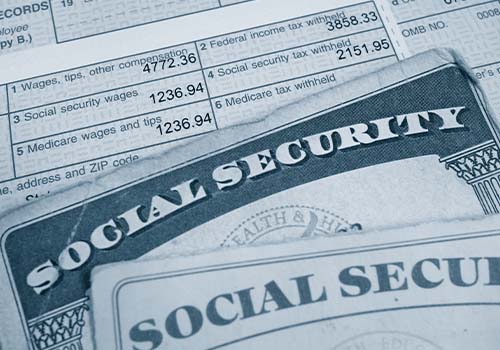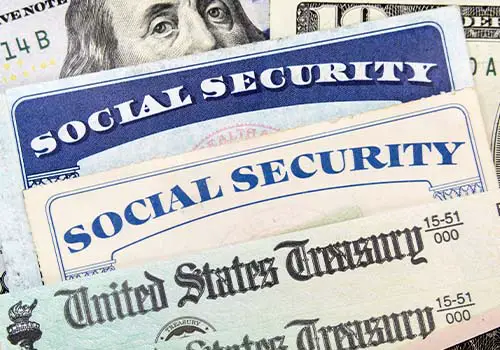Most people get disappointed when they see the amount of Social Security taxes withheld from their paychecks each month.
When it comes to self-employment, those individuals are usually left writing a big check to the IRS when income tax time rolls around.
Since Social Security taxes fund retirement and other benefits administered by the Social Security Administration (SSA), can you opt out of these programs?
Will the government allow you to opt out of paying taxes and receiving Social Security benefits? Keep reading as we give you all the details on opting out of Social Security.
Can You Opt Out Of Paying For Social Security?
Unfortunately, Social Security enrollment is automatic, and you cannot opt out of paying Social Security taxes.
When Congress enacted the Social Security Act, it was intended to provide financial assistance to retirees. Many individuals did not have a sufficient personal retirement plan at that time.
Remember that Social Security started during the Great Depression as a social program to help these retirees.
Participation in the program is mandatory, and you are required to pay into the Social Security system. In fact, your employer will automatically withhold the FICA tax of 7.65% and remit it to the IRS. In addition, your employer must also pay 7.65% of your earnings into the system, subject to the current cap on the OAISDI tax limit.
Though paying these FICA taxes is mandatory, a few groups of people are exempt from making these payments to the Federal government.
The eligibility requirements for exemption will be discussed more in the next section of this article. However, you should remember this.
- Opting out of these payroll taxes also excludes you from receiving any type of Social Security benefits in the future.
This includes both retirement benefits and disability benefits. Make sure that you discuss your options with a personal finance expert, or you could regret your decision when you reach retirement age.
KEY TAKEAWAYS
- Generally speaking, paying into the Social Security program is mandatory. However, there are a few instances where an exemption can be granted.
- Religious exemptions are the most common reason people opt out of the Social Security program.
- Opting out might not be the best option, even if you qualify for exemption. If the money saved from opting out is not used for other types of retirement, you may be in a dire financial situation when you try to retire.
Who Is Exempt From Paying Social Security?
There are several ways to avoid the Social Security tax, but the most common method is a religious exemption for clergy members.
However, the rules for this exemption are stringent. Religious exemptions are limited, so you won’t be able to make up a new religion to qualify. The IRS has strict rules about this exemption and requires specific documentation to qualify.
- You must be a member of a religious group that opposes collecting Social Security benefits. The religious sect must oppose the acceptance of any public insurance that pays benefits due to old age, death, retirement, or other circumstances.
- In addition to having these beliefs, the group must have existed since at least 1950. You cannot simply create a new religion and expect to qualify for this exemption.
- The group must also provide food, shelter, and medical care for its members and prove to the IRS that it has provided them with a decent standard of living since its inception.
- Lastly, you must complete the required documentation before leaving these taxes off your tax return.
To claim this exemption, you must complete both IRS Form 4361 and IRS Form 8274. These forms are the application for the exemption, plus a certification from the church or religious group.
In addition to the religious exemption, there are several other ways to avoid paying Social Security taxes.
- Self-employment income of less than $400 per year is exempt from these taxes. However, an individual cannot survive on this amount of money, so any additional income they make will likely be subject to Social Security taxes.
- Foreign citizens working for a foreign government in the United States are exempt from paying Social Security taxes, as are most foreign students, teachers, and researchers, as long as they are non-immigrant and non-resident aliens.
- State and local government employees who already pay into a public retirement plan are exempt from Social Security because that would essentially force them into paying into the public retirement system twice.
Finally, taxpayers who earn more than the Social Security tax limit are exempt from paying Social Security taxes on a portion of their income. In 2024, taxpayers must only pay Social Security taxes on their first $168,600 of income. Anything earned above this amount is exempt from the OASDI tax.
Must read articles related to Taxes
- The ins and outs of OASDI tax.
- What is the future of Social Security?
- Are there limits on Social Security Tax?
- How does the Social Security Trust Fund work?
- What does married filing separately mean, and should you do it?
Applying For Exempt Status

Just because you qualify for an exemption from the IRS does not mean you will automatically get it. It will usually require active effort to apply for and receive the exemption.
Some groups may receive automation exemption. Typically, foreign students and foreign government employees working in the United States will not need to complete an application with the IRS.
They should be exempt from paying these taxes due to the nature of their employment and citizenship status. However, you must apply for exempt status if you want to qualify under a religious exemption.
If you are part of an already recognized religious group, like the Amish or Mennonites, you must complete IRS Form 4029. You must file this form with the Internal Revenue Service and wait for approval before claiming the exemption in the current tax year and beyond.
For clergy and other ministers, Form 4361 will be required. One crucial thing to remember is that Form 4029 is a waiver of all future benefits. Even if you have already paid enough into the system, you waive your right to collect any benefits in the future.
- This includes retirement benefits, disability benefits, spousal or survivor benefits, and Medicare benefits.
Since this is a significant decision, you should likely consult a tax professional and personal financial planner before completing and submitting any of these forms.
They can help ensure you understand all the disclosures associated with these forms and all the ramifications of your decision. If you decide to proceed, you must get approval from the IRS to become exempt.
TIP
If you choose to opt out of the Social Security program, you will lose your right to collect future benefits, including retirement, disability, spousal or survivor, and Medicare benefits.
Advantages & Risks Of Opting Out Of Social Security
Paying fewer taxes sounds like it would always be a great decision. However, both advantages and risks are associated with opting out of Social Security. You have to weigh both as they apply to your personal situation to decide whether opting out is right for you.
So, what are the advantages and risks of opting out? Here are the most common ones.
Advantages of Opting Out
One of the most obvious advantages of opting out of Social Security is that you would get more money in your paycheck today.
- You would not be required to pay Social Security taxes. Instead, you could keep this money and invest it for your retirement on your own.
This may allow you to save more money and have a higher retirement income than you would receive on Social Security benefits.
Risks of Opting Out
While it might seem like a good idea to forego Social Security and save for retirement on your own, it might not be advantageous.
- Although you might be getting more in your paycheck today, many people will end up spending this money and not putting it aside for retirement, which will put them in a dire financial situation when retirement time rolls around.
Social Security is intended to be a safety net to help provide some financial assistance during retirement.
- Another risk is the fact that you could become disabled, and you would not qualify for Social Security disability benefits.
If you cannot work, these disability benefits could help you get by during that time. Similarly, your spouse and children would not qualify for survivor benefits at the time of your death.
This could be a considerable risk, especially if you do not purchase your own disability and life insurance.
Finally, health care coverage in your old age could be a problem.
- After you turn 65 and stop working, you will not be eligible for Medicare benefits, and it may be nearly impossible to purchase an affordable health insurance policy.
Although it sounds good in theory to avoid paying the 7.65% FICA tax today, opting out of the program is usually not a good idea.
The Bottom Line
While more than 95% of workers in the United States pay into the Social Security system, there are a few exceptions for opting out of the payments.
Not just anyone can opt out. Exemptions are reserved for only a few situations, and religious exemptions are the most common.
Qualifying for an exemption requires meeting the rules and applying and registering with the IRS.
Remember that opting out can waive your rights to all future benefits, sometimes even when you might already qualify for them.
Many financial experts agree that you should not opt out of Social Security even if you are eligible to.
Frequently Asked Questions
Yes, it is possible to opt out of Social Security and Medicare. The most common way to opt out is through a religious exemption.
If you are a minister, clergy member, or member of an already-recognized religious sect, you can opt out of these programs.
Similarly, most foreign students and government employees working in the United States are exempt from paying Social Security taxes.
Most of the time, opting out means you will not receive any retirement benefits from Social Security.
You can still save for retirement through an IRA or 401k plan. You can receive retirement benefits from these personal accounts upon reaching retirement age.
Some ministers who opt out yet already qualified for benefits based on previous participation might still be able to receive benefits based on their prior work history.
Social Security is the only option for most workers. Participation is mandatory except in a few rare circumstances.
State and local government employees may have an alternative to Social Security. If these employees are covered under a public retirement plan, they are not forced to pay into Social Security. This prevents them from being forced into paying into two public retirement plans.
You have no reason to opt out of Social Security if you don’t have a job. You are not required to pay Social Security taxes if you have no income, so opting out would provide you no benefit.
There is no income limit if you have already qualified for Social Security retirement benefits and have enough work credits.
There is no limit to how much you can earn while on Social Security retirement benefits. If you have a higher total income, you might be required to pay taxes on up to 85% of your Social Security benefits.
Whether or not your Social Security benefits are taxable depends on your total income. But, you will still be eligible for Social Security regardless of your income if you meet the other eligibility requirements.
You can find a Social Security Administration office near you by using our SSA office locator and searching for your closest location.





